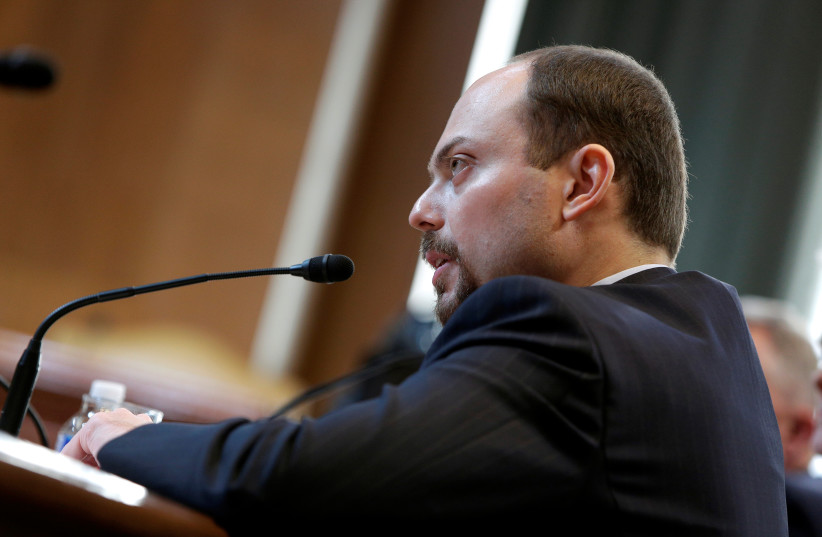Outspoken Kremlin critic Vladimir Kara-Murza was jailed for a quarter of a century by a Moscow court on Monday, the harshest sentence of its kind since Russia invaded Ukraine, after it found him guilty of treason and other offenses he denied.
Kara-Murza, 41, a father of three and former journalist who holds Russian and British passports, spent years as a politician opposing President Vladimir Putin and lobbied foreign governments and institutions to impose sanctions on Russia and individual Russians for purported human rights violations.
State prosecutors, who had requested the court jail him for 25 years, had accused him of treason and of discrediting the Russian military after he criticized what Moscow calls its "special military operation" in Ukraine.
In a CNN interview broadcast hours before he was arrested, Kara-Murza had alleged that Russia was being run by a "regime of murderers." He had also used speeches in the United States and across Europe to accuse Moscow of bombing civilian targets in Ukraine, a charge it has rejected.

In his final speech to the court last week, Kara-Murza had compared his own trial, which was held behind closed doors, to Josef Stalin's show trials in the 1930s and had declined to ask the court to acquit him, saying he stood by and was proud of everything he had said.
"Criminals are supposed to repent of what they have done. I, on the other hand, am in prison for my political views. I also know that the day will come when the darkness over our country will dissipate," he had said.
Shortly after sending tens of thousands of troops into Ukraine in February last year, Russia introduced sweeping wartime censorship laws which have been used to silence dissenting voices across society.
"Discrediting" the army can currently be punished by up to five years in prison, while spreading deliberately false information about it can attract a 15-year jail sentence.
At a time of what they have cast as an existential struggle with the West, pro-government politicians say unity across society is vital and have described Russian citizens questioning Moscow's actions in Ukraine as part of a pro-Western fifth column trying to undermine the military campaign.
Twice, in 2015 and 2017, Kara-Murza fell suddenly ill in what he said were poisonings by the Russian security services, on both occasions falling into a coma before eventually recovering.
Russian authorities denied involvement in the incidents. Kara-Murza's lawyers say that as a result, he suffers from a serious nerve disorder called polyneuropathy.
Countries condemning Russia's decision
The British government summoned the Russian ambassador to make clear its condemnation of what it described as the "politically motivated" conviction and sentencing of outspoken Kara-Murza, a British dual national.
The German foreign ministry sharply condemns the sentencing of Kara-Murza, a spokesperson for the ministry said on Monday during a government press conference.
The United Nations human rights chief called on Moscow to free long-time Kara-Murza.
"No one should be deprived of their liberty for exercising their human rights, and I call on the Russian authorities to release him without delay," said Volker Turk, UN High Commissioner for Human Rights in a statement.
He added that the sentence was "another blow to the rule of law and civic space in the Russian Federation".
The United States condemns the sentencing of Kremlin critic Vladimir Kara-Murza for "speaking out against the Russian government’s war of aggression against Ukraine," the US State Department said in a statement on Monday.
"Mr. Kara-Murza is yet another target of the Russian government’s escalating campaign of repression," the department said after Russia sentenced Kara-Murza to 25 years in prison on treason and other charges earlier on Monday.
France's foreign ministry on Monday condemned the sentencing of Kremlin critic Vladimir Kara-Murza to 25 years in prison for treason, saying the Russian justice system had become a tool for oppression.
It added that the sentencing was another illustration of the Russian authorities' campaign of repression against all voices critical of the Russian leadership and its war of aggression against Ukraine.
Norway's foreign ministry on Monday condemned the sentencing of Kremlin critic and human rights activist Vladimir Kara-Murza to 25 years in prison.
"This is a deeply alarming and harsh sentence for exercising the right to freedom of expression," Norwegian foreign minister Anniken Huitfeldt said in a statement.
